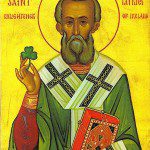 Lectionary Reflections for the Second Sunday in Lent
Lectionary Reflections for the Second Sunday in Lent
March 16, 2014
Genesis 12:1-9 (RCL, Genesis 12:1-4a)
Psalm 121
Romans 4:1-5
John 3:1-13, 16-17 (RCL, John 3:1-17)
Sometimes the Revised Common Lectionary gives readings that are too brief to cover the theme. Other times, the Revised Common Lectionary suggests readings that cover too much ground or raise too many questions to be helpful. In today’s case, I expand the First Testament reading from Genesis 12:1-4a to Genesis 12:1-9 to include Abram and Sarai’s spiritual practices and to recognize Sarai’s role in the journey. I subtract a few verses from John 3:1-17, eliminating verses 14-15, and their obscure description of the relationship of Moses’ serpent and the lifting up of the Son of the Man.
Genesis 12:1-9 describes the call of Abram and Sarai (Abraham and Sarah). Late in life and childless, they are called to leave their familiar world to begin a pilgrimage to a promised land. Along with the promise of a new land, they receive the vision of a great nation emerging from their offspring. They are invited to imagine an impossible future, and take the first steps toward its achievement. The impossible becomes possible by the interplay of divine call and human response, beginning with Abram’s and Sarai’s “yes” that transforms the world. Called by God, this elderly couple move from inaction to action and embark upon an unexpected and perilous journey, not unlike Bilbo Baggins, Luke Skywalker, Thor Heyerdahl, or the protagonist of Pilgrim’s Progress.
Abram and Sarai erect altars of transformation at each stopping place. At first, the altars are erected to lure God to join them on the journey; after all, gods were localized to geographic places. Later, I believe the altars were built to remind them that God was with them wherever they might sojourn. Abram and Sarai experienced an evolutionary leap in theological reflection: God is unbounded and global, not just tribal and regional.
The adventurous preacher might invite congregants to consider toward which new lands each one individually, and the congregation as a whole, is called to journey. Along the way, what altars of transformation might they erect as individuals and as a congregation? Altars are the spiritual practices that enable us to experience God on the journey. In building altars, we heighten our spiritual awareness and find more light and energy for the journey.
Psalm 121 invites us to give thanks for God’s protection on the journey. God surrounds and guides us, and keeps us from all evil. Yet, we do experience evil and suffering. Does this mean that God has abandoned us? Or does God give us what we need to face the challenges, indeed, the evils of life?
The reading from Romans 4 describes the dynamics of faith. Paul appears to suggest a conflict between divine and human initiative, and faith and works. In contrast to this interpretation, I see faith and works as part of a lively divine-human call and response. Our works do not threaten God’s glory or sovereignty, but enable God to be more active in the world. Abram and Sarai are not passive in relationship to God. Their trust in God enables them to take initiative and begin a holy adventure with God as their companion. Faith and trust inspire action, rather than passivity. Even if grace is perceived as undeserved, based on our previous turning from God, our relationship to God’s grace is one of affirmation, acceptance, and action. God does not withhold grace from frail humankind, but works with human imperfection – as is clear from the saga of Abram and Sarai – to bring forth relevant possibilities and the energy to embody God’s vision.
John 3:1-13, 16-17 continues the theme of divine initiative. Being born from above, born anew, is the result of divine initiative. God creates new life from our imperfections – God breathes life into our dry bones – and enables us become spiritually fresh once more. God’s Spirit gives us spiritual CPR and gives life to what is currently dormant – or dead – within us, enabling us to hope and act anew.
God’s Spirit is unbounded, unexpected, and unconfined. It comes to any and all persons on God’s terms. We cannot localize it through doctrine, worship style, spiritual practice, or ecclesiology. It is free and untamed, and invites us to be free and untamed as well.
God’s love is equally untamed: God loves the world, the world of flesh and blood in all its messiness. God seeks to save all. Condemnation is not part of God’s vision; God wants all to be saved and affirmed. God aims at abundant life: all are chosen, but the working out of our relationship with God is conditioned by our response. Our “yes” places us consciously in God’s circle of love and opens us to relationship with God in all of its fullness. Perishing is possible; but not part of God’s intention.
Today, we must expand our understanding of the world to include the whole earth. God does not want planetary life to perish, but to be born anew. God wants us to be active recipients of grace, embracing God’s vision and taking initiative to be God’s companions in healing the earth.












